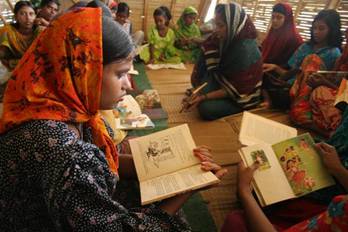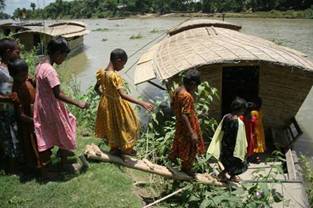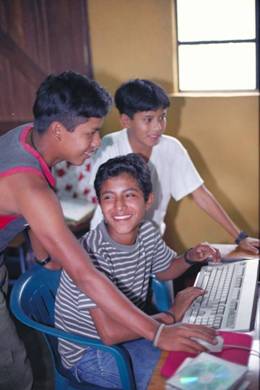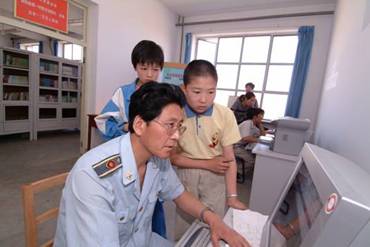The Access to Learning Award
Whether you are young or old, a student or a teacher, a farmer or a small business owner, access to online information is becoming increasingly important throughout the world.
The Internet is now a portal that provides unprecedented opportunities to pursue education and employment access government services, seek health information, conduct business, or exchange ideas and information. Unfortunately, while access to computers is common in many parts of the world, just one person in 10 has access to the Internet. The result is a dramatic digital divide: nearly five billion people do not have the opportunity to benefit from online information and learning.
To help narrow this divide, the Bill & Melinda Gates Foundation’s Global Libraries initiative, part of the foundation’s Global Development programme, works to provide people with the opportunity to access a world of information, knowledge, and communication by helping public libraries provide free computers connected to the Internet and training in the communities they serve. Each year, a highlight of the Global Libraries initiative’s work is the announcement of its Access to Learning Award (ATLA). Now in its eighth year, the USS1 million award recognises the innovative efforts of public libraries or similar organisations outside the United States to connect people to information through free access to computers and the Internet. Organisations in countries from China to South Africa have received the award for their creative work to provide free access to online information in libraries, many in remote, developing, or poverty-stricken areas. The award is given to encourage more countries and communities to harness the power of the Internet and partner with libraries to provide greater access to information and learning for people most in need.
ATLA recipients are models of how organisations and governments can work together to open a world of knowledge through access to information technology in even the most isolated and impoverished environments. The award recipients’ own stories provide rich examples of how free access to computers and the Internet can change the lives of people who might otherwise never be able to benefit from online information and learning.
READ Nepal: A Centre of Community Development
Rural Education and Development (READ) Nepal, a non-profit organisation based in Kathmandu, received the Access to Learning Award in 2006 for its innovative work in building self-sustaining libraries to increase local community development.

In Nepal, among the poorest and least developed countries in the world, nine out of 10 people live in rural areas, and one person in three live in extreme poverty. Just half of adult Nepalis can read or write. To address the country’s educational, economic and social inequities, READ works with local communities to create rural libraries throughout the country that serve as centres for information and learning. Since 1991, READ has established 39 self-supporting community libraries throughout Nepal - touching the lives of half a million people.
The organisation provides seed funding to design, build, furnish, and stock libraries, train librarians, and launch an income-generating enterprise in each community to help pay for the library over the long-term. To guarantee strong local commitment the community must contribute land and cover 20 percent of the library’s start-up-costs. In one village, a man donated his former home. In another, an illiterate woman gave land so her grandchildren could learn to read. Some villagers participate by selling a handful of rice, which is often the most they can afford.
Before a library is built, villagers develop a plan for a revenue-generating enterprise that can cover ongoing library costs. Communities have forged a variety of businesses, including a furniture factory, printing press, stationery store, grain mill, fishpond, as well as ambulance, rickshaw, storefront rental, telephone, and x-ray services. These community-run projects are paramount to READ’s success. Often, the projects raise considerably more money than library operations require and have funded additional community development projects such as childcare centres, health clinics, literacy centres, and a bridge so that children aren’t forced to walk two hours each direction along a river to get to school.
The Access to Learning Award is helping to support READ’s library development projects, induding effort to increase the number of computers available in libraries, develop a community Internet network that can reach remote areas not yet served by the existing communications infrastructure, and bring new interactive educational and medical resources to the libraries. With additional funding, READ has been able to continue providing rural Nepali communities with a safe place to access and share information despite a climate of political and economic instability.
Far Reaching Impacts
Foundation-sponsored evaluations of the ARA programme have shown that the award is making a real difference in the countries where it has been awarded. Most recipients have used the award funds to not only expand their current operations, but also to emphasise technology training, literacy, and local content development in their work. Some are working to help users identify ways to use online information to build economic opportunities.
Past ATLA recipients are becoming increasingly prominent and influential in their local communities and beyond. The award helps increase public awareness of the programmes and helps build opportunities for new partnerships and funding. For example, the Smart Cape Access Project, which received the award in 2003 for giving residents in Cape Town, South Africa free access to computers and the Internet for the first time, was recently asked by the mayor to create a visioning statement for a city-wide social and economic development strategy in which computers and the Internet play a fundamental role.
Bangladesh’s Shidhulai Swanirvar Sangstha: A River of Opportunity
A computer connected to the Internet can be a powerful driver of social and economic progress - especially in developing countries. Another past ATLA recipient shows how a creative approach to bridging the digital divide can have a startling impact. Shidhulai Swanirvar Sangstha, a Bangladeshi organisation, was honoured in 2005 for its groundbreaking work in using indigenous boats to bring computers, the Internet, and training to remote areas of the country. Founded in 1982, Shidhulai Swanirvar Sangstha is devoted to improving the lives of people in remote areas of Bangladesh by empowering them through information sharing and education. Through work such as its innovative mobile boat programme, the organisation works in the areas of distance and technology-mediated learning, environmental awareness and conservation, micro enterprise development, food security, and health.

In Bangladesh’s isolated river basin farming communities, people rely heavily on some of the country’s 7,000 rivers for their day-to-day needs. To serve these areas, Shidhulai Swanirvar Sangstha supplies custom-built, indigenous boats converted into mobile libraries and schools to provide educational services, access to technology, and computer trainings. Relying on solar energy and generators to power computers, projectors, and other technical equipment, the boats anchor at remote villages educating farmers about environmentally friendly agricultural methods, small business development, microfinance, health care, and more. In a country where the majority of the population is illiterate, Shidhulai Swanirvar Sangstha has made significant strides in educating young people who had never before even seen a computer.
Through ATLA funds, the organisation was able to build six additional library boats and three school boats, upgrade computers, and help underwrite a new training facility. But an influx in extra funds was not the only advantage that came with receiving the award. The programme has experienced an increase in donations and is now able to negotiate with technology companies to receive reduced prices for upgraded equipment. In addition, the organisation has initiated partnerships with a number of outside organisations in an effort to replicate the programme’s success in other struggling regions.
Using their ATLA funds, Shidhulai Swanirvar Sangstha recently helped introduce bicycle-powered water pumps to rural farmers in Bangladesh. The pumps are now manufactured locally, and have been so profitable that others are using them in different parts of the country. As a result of educating farmers about the pumps, the average annual income in areas the project serves is now at 19,800 Bangladeshi Taka (BDT) - an incredible increase of BDT 12,000. Residents in these areas now have a better diet, new and improved houses, and better healthcare.
Sustaining Free Access to Technology
ATLA is helping to highlight innovation and success, and also points to the ongoing challenges libraries and similar organisations still face in providing free access to computers and the Internet. Securing affordable and sufficient bandwidth is an enormous challenge for which no simple solutions exist. Improving staff training on advancing technologies and supporting a greater number of people using a library or organisation’s services are both significant hurdles especially when they struggle to secure and keep funding to operate such pioneering operations.

Promoting the groundbreaking work of libraries to provide computers and the Internet is an important step in building greater access to these tools throughout the world. Ensuring that ATLA recipients and other similar organisations can sustain their work is a critical part of opening the information age to developing countries. Strong, visionary leadership at the local project level is vitally important to building and maintaining healthy technology programmes. As well, creative partnerships between private sector funders and experts, and local governments can provide effective support for information technology initiatives in the developing world. Ultimately, the success of free public technology programmes requires the long-term commitment of governments, businesses, community groups, and libraries around the globe - a goal, which is paramount to the efforts of the Gates Foundation’s Global Libraries initiative.
Bringing Information Resources to Rural China
The China Evergreen Rural Library Service Centre (CERLS), a 2004 ATLA recipient, is showing how local government collaboration can help ensure sustainability and strengthen free technology programmes.
Two-thirds of China’s 1.3 billion people live in rural areas with extremely limited access to information technology. These resources are even scarcer in western China, an area characterised by poverty and illiteracy that has not yet benefited from the growth and prosperity of the coastal region.

To help address this need, the China Evergreen Rural Library Service Centre forms partnerships with school libraries to develop and computerise library collections, create computer labs for the entire community, and offer training workshops to students, teachers, librarians, and the public. Since its founding in 2001, CERLS has added 10 public school libraries to its network, serving a community of more than 1 million people.
CERLS schools go out of their way to reach those least likely to seek out their services. One teacher travels to remote villages with a laptop computer to teach farmers about new agricultural techniques and environmental issues. Another school created a mobile library to reach herdsmen with information in both Tibetan and Chinese. CERLS also sets up service stations in places that locals gather, including cultural activity centres and fine art shops.
Having the support of everyone involved, from teachers to principals to county governors, has been key to the programme’s success. While CERLS supplies the computer equipment, software, training, and books, schools provide the Internet access, librarians, staff, space, and furniture. Local and provincial governments and ministries also help out by providing extra computers and equipment.
To further encourage local commitment to libraries, the organisation has used some of its ATLA funds to sponsor competitions and increase participation among students, provide scholarships for technology educational programmes, and organise skills workshops for librarians, teachers, and users. CERLS has also increased their outreach programmes to farmers and educated more rural workers about higher-yield crops. Thanks to the expansion of their programme, there is stronger community support and more visibility of the organisation’s work both locally and abroad.
Continuing to Support Innovation Around the World
ATLA recipients show the world how access to knowledge and information can help build better lives and stronger communities. They are also expanding the value of traditional libraries by connecting them to larger individual and community development goals. In the end, ATLA recipients are leading development that starts in libraries, but spreads to entire villages, towns, and cities.
To enhance the impact of the award, the Global Libraries initiative plans this year to strengthen the network of former and current ATLA recipients, so they can more effectively share their knowledge and experience not only with one another, but with others who are developing new ways to improve the lives of people most in need. Through better collaboration, ATLA recipients and others can exchange ideas for delivering free information technology programmes and address challenges like providing Internet connections in remote areas, or sustaining the services over the long term.
In choosing future ATLA recipients, the foundation will continue to seek applicants that serve people in high-poverty environments, and will honour those that employ truly extraordinary approaches to providing free access to computers and the Internet. Fortunately, each year the foundation has seen a marked increase in applicants. It seems there is a growing tide of creativity within the field. Indeed, it appears ATLA recipients will continue to bring their legacy and value to the world, combining social ingenuity with a desire to improve people’s lives.
About Global Libraries
Information technology is a powerful driver of economic and social progress. Unfortunately, while access to computers is common in many parts of the world, just one person in 10 has access to the Internet. The result is a dramatic digital divide: nearly five billion people do not have the opportunity to use computers connected to the Internet. Without access, people miss out on opportunities to strengthen their education, look for work, conduct business online, and exchange ideas with others around the world. In countries where reliable health information is hard to find, the Internet can also be a vital resource for health workers and others.
To help narrow this divide, the foundation’s Global Libraries initiative helps public libraries provide free access to computers, the Internet, and training in the communities they serve. As a programme partner, Microsoft donates software. Public libraries are ideal partners in this initiative because of their tradition as publicly-funded learning centres that are open to everyone. Libraries also have staff members who receive training to help others learn to use these tools, resulting in communities that benefit from all the opportunities greater access to the Internet provides. Global Libraries has already forged successful partnerships in Chile and Mexico where the impact has been demonstrated clearly and measurably within a few years of implementing a programme. New partnerships with Botswana, Latvia, and Lithuania were announced in November 2006.
For more information about the Access to Learning Award, please visit: https://www.gatesfoundation.org/
Any public library or similar organisation outside the United States may apply for the Access to Learning Award if they allow all members of the public, from children to senior citizens, to use computers, the Internet, and their facilities free of charge. The foundation particularly encourages institutions in developing countries or those working with disadvantaged communities to apply, as preference is given to organisations that reach out to socially excluded groups, such as poor or disabled patrons, or those from minority communities.
The award is a one-time recognition or prize for organisations that have created programmes that are currently committed to providing free access to computers and the Internet. An international advisory committee made up of librarians, information technology experts, and foundation staff evaluates applications based on candidates' innovative efforts to make computers and Internet access free to the public, train the public in using technology and accessing information, educate staff on technology use, and reach out to underserved communities. The committee selects a list of final candidates for consideration by the Gates Foundation and, following an independent financial and organisational review of the finalists, the foundation selects the final award recipient.
2006: Rural Education and Development (READ) Nepal
https://www.readglobal.org/read-offices/read-nepal/.
2005: Bangladesh's Shidhulai Swanirvar Sangstha
https://www.shidhulai.org/.
2004: Denmark's Aarhus Public Libraries
http://www.aakb.dk/.
2004: China Evergreen Rural Library Service Centre
http://www.evergreeneducation.org/.
2003: Smart Cape Access Project
https://we-gov.org/catalog/?ckattempt=1&mod=document&uid=735/.
2002: BibloRed
https://www.biblored.gov.co/.
2001: Proyecto Bibliotecas Guatemala (Probigua)
https://www.idealist.org/es/ong/334f322cd63a4b3f8717adfba0c9adb7-proyecto-bibliotecas-guatemala-probigua-la-antigua/.
2001: Biblioteca del Congreso, Argentina
https://www.bcn.gob.ar/.
Director
Global Libraries Initiative
Bill & Melinda Gates Foundation

